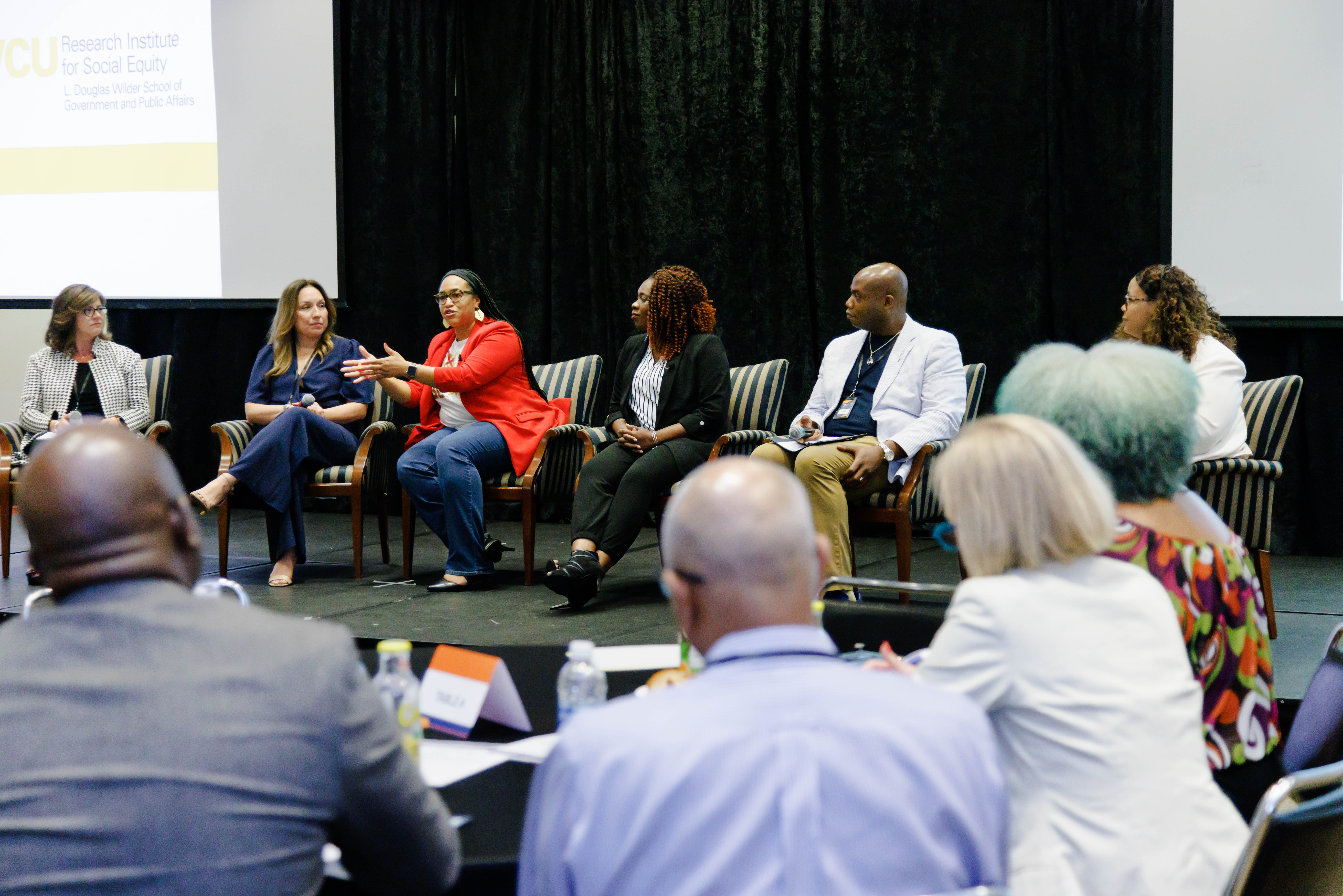News
Black and Hispanic entrepreneurs convene to discuss keys to business expansion and wealth building

by Pam Cox
What is the quickest way to grow wealth for Blacks and Hispanics in Richmond, Virginia?
This topic and more were at point of mind during the Create, Grow, Scale: Black & Hispanic Entrepreneurship Convening held at Virginia Commonwealth University on May 16, 2023. The event was organized through a partnership between the Wilder School Research Institute for Social Equity (RISE) and the Capital One Insights Center.
“It is important for us to discuss ways to increase equity in entrepreneurship,” said Nakenia Douglas-Glenn, director of RISE. She added that the convening was organized to give “Black and Hispanic entrepreneurs an opportunity to gain knowledge and resources to assist them in expanding their business and fostering wealth.”
The day-long convening brought together individuals and organizations with a vested interest in advancing the success of Black and Hispanic entrepreneurs. It was an opportunity for Richmond-area business owners to hear the findings from a Fall 2022 study on Black and Hispanic businesses in the city. The study, conducted by Boston Consulting Group and commissioned by Capital One Insights Center, revealed that while 35% of Black and Hispanic businesses grew wealth, there is a wide disparity in access to start-up costs and business loans as compared to non-minority companies.
The report outlined critical factors to success and wealth building, including a thriving business ecosystem. The study focused on Richmond for several reasons, including the projection that the population will grow by more than 19% by 2050 and that the average Black and Hispanic business has been open for more than 12 years representing the service, retail, and manufacturing sectors.
A fireside chat gave participants the opportunities to discuss and ask questions about the research. The chat was moderated by Shena Ashley, Ph.D., president of the Capital One Insight Center, with David Rabkin, executive vice president and head of card & payments. Highlights included addressing the disparity in financial support for minority businesses and ways companies like Capital One can provide greater access to business funding, knowledge and support, and business development training. The Capital One leadership emphasized the importance of a supportive business ecosystem in helping entrepreneurs on the road to wealth creation.
“In order to have a thriving business, you have to have a vibrant community,” said Rabkin. “Most Black and Hispanic neighborhoods don’t have the resources and access to start up costs. It’s important to pour into small businesses so they thrive and grow wealth, which supports the local economy.”
Rabkin noted that entrepreneurs should focus on acquiring five various types of capital to ensure business success. They are: asset capital, institutional capital, human capital, knowledge capital, and cultural capital.
The keynote speaker was the CEO of Kickstarter and Richmond native, Everrette Taylor, who shared his journey to entrepreneurship. He encouraged fellow business owners and those interested in starting one to “go to the edge of your comfort zone and take another step.”
Wilder School associate professor Elsie Harper-Anderson, Ph.D. followed the keynote address by sharing results of her research on Minority Business Enterprise (MBE) in Richmond. The report revealed the need to create a stronger partnership model for Black and Hispanic Entrepreneurs. Harper-Anderson punctuated that “entrepreneurship involves more than business related inputs, but personal and life inputs as well. Business owners realize that they work more “in” their business, leaving less time to work “on” their business.”
A panel discussion with local entrepreneurs was led by Wilder School associate professor Meghan Gough, Ph.D. The panelist were: Rasheeda Creighton(president & CEO, Jackson Ward Collective Foundation), Sandi Cano Cauley (founder & owner,Scott Hill Creative & Turn Cardio JAM Studio), Brown Hansbaro (owner & lead designer, The Flower Guy Bron), Telisha Woodfin (founder & owner, LIVLoved). Their discussion, “Wealth creation is not just about numbers and dollars, it’s what we create and offer,” gave them the opportunity to share their experience and offer advice. The panelists discussed what they referred to as three parts to financial freedom that entrepreneurs should consider: 1)Individual wealth can take care of my family, 2) Importance of individual investment money to live beyond, and 3) Pouring into others through community investment. The day concluded with an in-depth conversation on what the entrepreneurs learned and how best to spread the information to other entrepreneurs.
The convening continued for a second day at the Michael Wassmer Innovation Center at 1717, a startup incubator in Richmond, for a half-day strategy session facilitated by RISE. The goal was to create solutions and actions that will strengthen relationships between lenders/funders and Black and Hispanic business owners. The day provided an opportunity for networking with local business owners and key stakeholders within Richmond’s entrepreneurial ecosystem.
The Research Institute for Social Equity (RISE) within the Wilder School serves as a vehicle to advance racial equity and social equity through multidisciplinary scholarship, research, training, and engagement. The goal of RISE is to be the national leader in advancing social equity through informing public policy, governance, and practice to improve conditions for marginalized voices within our society, including communities of color, LGBTQIA individuals, people with disabilities, incarcerated populations, survivors of domestic violence, and women.